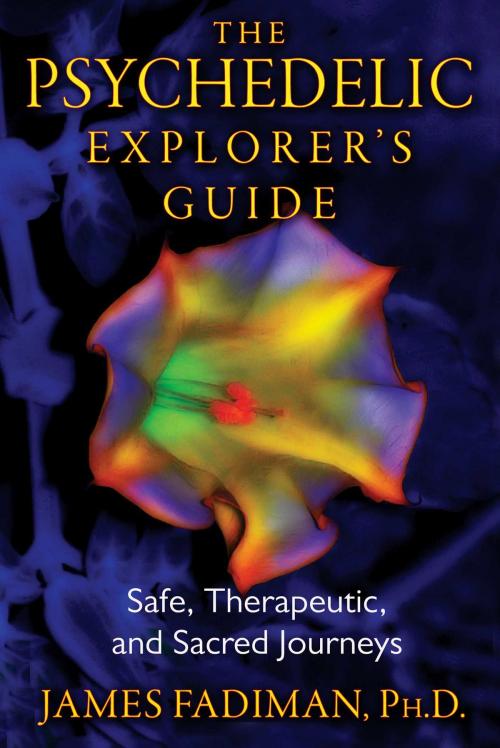The Psychedelic Explorer's Guide
Safe, Therapeutic, and Sacred Journeys
Nonfiction, Religion & Spirituality, New Age, Mysticism, Social & Cultural Studies, Social Science, Cultural Studies, Popular Culture| Author: | James Fadiman, Ph.D. | ISBN: | 9781594779367 |
| Publisher: | Inner Traditions/Bear & Company | Publication: | May 18, 2011 |
| Imprint: | Park Street Press | Language: | English |
| Author: | James Fadiman, Ph.D. |
| ISBN: | 9781594779367 |
| Publisher: | Inner Traditions/Bear & Company |
| Publication: | May 18, 2011 |
| Imprint: | Park Street Press |
| Language: | English |
Psychedelics for spiritual, therapeutic, and problem-solving use
• Presents practices for safe and successful psychedelic voyages, including the benefits of having a guide and how to be a guide
• Reviews the value of psychedelics for healing and self-discovery as well as how LSD has facilitated scientific and technical problem-solving
• Reveals how microdosing (ultr-low doeses) improve cognitive functioning, emotional balance, and physical stamina
• This year 600,000 people in the U.S. alone will try LSD for the the first time, joining the 23 million who have already experimented with this substance
Called “America’s wisest and most respected authority on psychedelics and their use,” James Fadiman has been involved with psychedelic research since the 1960s. In this guide to the immediate and long-term effects of psychedelic use for spiritual (high dose), therapeutic (moderate dose), and problem-solving (low dose and microdose) purposes, Fadiman outlines best practices for safe, sacred entheogenic voyages learned through his more than 40 years of experience--from the benefits of having a sensitive guide during a session (and how to be one) to the importance of the setting and pre-session intention.
Fadiman reviews the newest as well as the neglected research into the psychotherapeutic value of visionary drug use for increased personal awareness and a host of serious medical conditions, including his recent study of the reasons for and results of psychedelic use among hundreds of students and professionals. He reveals new uses for LSD and other psychedelics, including microdosing, extremely low doses, for improved cognitive functioning and emotional balance. Cautioning that psychedelics are not for everyone, he dispels the myths and misperceptions about psychedelics circulating in textbooks and clinics as well as on the internet. Exploring the life-changing experiences of Ram Dass, Timothy Leary, Aldous Huxley, and Huston Smith as well as Francis Crick and Steve Jobs, Fadiman shows how psychedelics, used wisely, can lead not only to healing but also to scientific breakthroughs and spiritual epiphanies.
Psychedelics for spiritual, therapeutic, and problem-solving use
• Presents practices for safe and successful psychedelic voyages, including the benefits of having a guide and how to be a guide
• Reviews the value of psychedelics for healing and self-discovery as well as how LSD has facilitated scientific and technical problem-solving
• Reveals how microdosing (ultr-low doeses) improve cognitive functioning, emotional balance, and physical stamina
• This year 600,000 people in the U.S. alone will try LSD for the the first time, joining the 23 million who have already experimented with this substance
Called “America’s wisest and most respected authority on psychedelics and their use,” James Fadiman has been involved with psychedelic research since the 1960s. In this guide to the immediate and long-term effects of psychedelic use for spiritual (high dose), therapeutic (moderate dose), and problem-solving (low dose and microdose) purposes, Fadiman outlines best practices for safe, sacred entheogenic voyages learned through his more than 40 years of experience--from the benefits of having a sensitive guide during a session (and how to be one) to the importance of the setting and pre-session intention.
Fadiman reviews the newest as well as the neglected research into the psychotherapeutic value of visionary drug use for increased personal awareness and a host of serious medical conditions, including his recent study of the reasons for and results of psychedelic use among hundreds of students and professionals. He reveals new uses for LSD and other psychedelics, including microdosing, extremely low doses, for improved cognitive functioning and emotional balance. Cautioning that psychedelics are not for everyone, he dispels the myths and misperceptions about psychedelics circulating in textbooks and clinics as well as on the internet. Exploring the life-changing experiences of Ram Dass, Timothy Leary, Aldous Huxley, and Huston Smith as well as Francis Crick and Steve Jobs, Fadiman shows how psychedelics, used wisely, can lead not only to healing but also to scientific breakthroughs and spiritual epiphanies.















